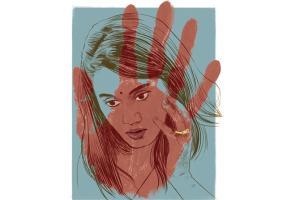A powerfully feminist film addressing domestic abuse, it is on par with his earlier Mulk and Article 15, both compelling films on pressing issues.

Illustration/Uday Mohite
 No doubt Anubhav Sinha's Thappad (Slap) is one of the most important Bollywood films in recent times. A powerfully feminist film addressing domestic abuse, it is on par with his earlier Mulk and Article 15, both compelling films on pressing issues. It carries forward the feminist concerns of recent Bollywood films, including Pink, Chhapaak and Panga, as well as thoughtful, recent films in other languages, including Rosshan Andrrews' Prathi Poovankozhi (Accused: Rooster, Malayalam), Manu Ashokan's Uyare (High, also Malayalam), and Abhishek Shah's Hellaro (Gujarati), all of which released last year.
No doubt Anubhav Sinha's Thappad (Slap) is one of the most important Bollywood films in recent times. A powerfully feminist film addressing domestic abuse, it is on par with his earlier Mulk and Article 15, both compelling films on pressing issues. It carries forward the feminist concerns of recent Bollywood films, including Pink, Chhapaak and Panga, as well as thoughtful, recent films in other languages, including Rosshan Andrrews' Prathi Poovankozhi (Accused: Rooster, Malayalam), Manu Ashokan's Uyare (High, also Malayalam), and Abhishek Shah's Hellaro (Gujarati), all of which released last year.
ADVERTISEMENT
Thappad is about a devoted wife Amrita (Taapsee Pannu), whose husband Vikram (Pavail Gulati) slaps her publicly at a party, on learning that his promotion has been cancelled. Amrita's response is shock, then withdrawal; she retreats to her mother's home for some headspace. She talks it over with her parents and firmly concludes that she wants a divorce, because she does not deserve to be slapped. Not. Even. One. Slap. An acrimonious legal battle follows. But Amrita holds on to her morally superior position with dignity and resolve, because she wants nothing from her husband at all. Other than intangibles, respect and a divorce—not alimony or property—but she realises respect is what she must give herself first.
The power of the nuanced screenplay, written by Anubhav Sinha and Mrunmayee Lagoo Waikul, is in first persuading the viewer that Amu is clearly over-reacting by staking a whole marriage on "just one slap," then reveals why everyone who believes that, is mistaken. Especially the good guys. Vikram is not a bad guy, he is "just" entitled, insensitive, and has no clue how he hurts his wife, or of her tremendous sacrifices for his career, over her own. Likewise, with Amu's sensitive dad (Kumud Mishra, wonderful). We see how deeply patriarchy is entrenched in all classes—in Amu's well-off family, her sharp lawyer (Maya Sarao) whose husband denies her professional credit, and her help (Geetika Vidya Ohlyan, affecting), who is routinely thrashed by her husband. Also, how patriarchy is inherited, and how women are complicit in patriarchy, including her mother (Ratna Pathak Shah) and mother-in-law (Tanvi Azmi), whose adoration of Amrita is realised in a moving scene. Pannu is superb as Amrita, see-sawing between vulnerability and strength, with a strong supporting cast. The script emphasises how women's decency triumphs revenge. All embellished with that evocative Ek Tukda Dhoop song.
Women's inherent decency triumphing, rather than taking revenge against men who have wronged them, is exactly the subject of Prathi Poovankozhi (Zee5) and Uyare (Netflix). In the former, Manju Warrier is terrific as a feisty woman, molested in a crowded bus. She is unable to take revenge because, when she finally finds the creep, he is debilitated, and she won't stoop as low as him. But a young girl in the bus thrashes her molester soundly, so her spirit lives on. In Uyare, the lovely Parvathy, training to be an airline pilot, is disfigured in an acid attack by her jealous boyfriend.
But, while her court case against her attacker dawdles in the courts, she chooses to fulfil her own dreams, rather than take personal revenge, also seen in Chhapaak, released subsequently. She first becomes an airhostess, and later, an airline pilot. We don't need no Arjun Reddy, thanks. Living well is the best revenge.
Meenakshi Shedde is India and South Asia Delegate to the Berlin International Film Festival, National Award-winning critic, curator to festivals worldwide and journalist. Reach her at meenakshi.shedde@mid-day.com
Catch up on all the latest Crime, National, International and Hatke news here. Also download the new mid-day Android and iOS apps to get latest updates
 Subscribe today by clicking the link and stay updated with the latest news!" Click here!
Subscribe today by clicking the link and stay updated with the latest news!" Click here!






